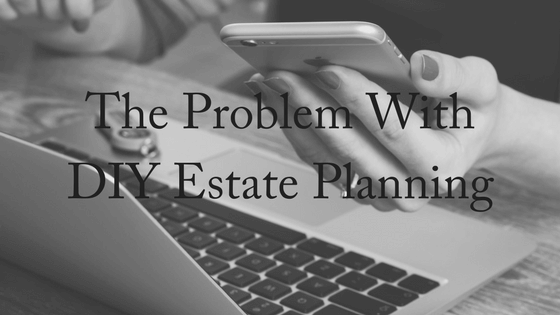It can be tempting for people to forego estate planning advice and go down the route of DIY estate planning. Using online sites to craft DIY estate planning documents such as wills and powers of attorney is appealing for those who can’t (or don’t want to) pay for legal advice. But there can be significant risks as well, especially if someone’s financial situation is complex or involves issues that potentially need legal oversight.
The Risks of DIY Estate Planning
You may think that DIY estate planning may work well for you because you don’t have a complicated estate, but the truth is that most people have a degree of complication. If you’ve got a partner or spouse and children, you’ve added another degree of complication, and add to this the accumulation of assets, divorce, remarriage, births, illness, owning a business and retirement – quickly your DIY estate planning can’t cope.
You may miss something
 It’s really common for people who DIY estate planning miss things simply because they don’t understand the complexity of succession law. This can lead to significant ramifications for their estate, from litigation to paying lots of tax to creating a will that’s simply invalid. Always seek comprehensive advice – a specialist will consider every scenario to make sure nothing is missed.
It’s really common for people who DIY estate planning miss things simply because they don’t understand the complexity of succession law. This can lead to significant ramifications for their estate, from litigation to paying lots of tax to creating a will that’s simply invalid. Always seek comprehensive advice – a specialist will consider every scenario to make sure nothing is missed.
You may create litigation
Because you don’t know the law, your DIY estate planning may inadvertently leave your estate open to a court battle. The law imposes obligations on will-makers in several different ways, and if you don’t understand these, your will could be challenged. A specialist in wills and estates will reduce the threat of litigation on your estate.
Understanding the role of executor
Choosing the correct executor is vital to making sure the estate is properly handled in a timely way. The Executor has enormous legal obligations and can be held personally liable if they don’t undertake their duties correctly. A dishonest executor can be disastrous for your estate. Choosing the wrong person for the job may cost the estate time and money.
 Under-estimating your estate
Under-estimating your estate
DIY estate planning relies on the belief that your estate is too small to justify planning advice. The classic example is superannuation – most, if not all, working Australians have superannuation which can include significant life insurance. Your will doesn’t directly deal with your superannuation, so it’s worth getting advice that can handle every aspect of your estate.
Don’t ignore the risk of mental incapacity
Estate planning is not just about planning for death but should also take into account what happens if someone becomes mentally incompetent due to an illness like a stroke or dementia, or due to an accident.
This is not a one-time deal
Your estate planning shouldn’t get done once and then forgotten about. It should be reviewed every few years at a minimum, or whenever there is a significant change to someone’s personal or financial affairs. Regular reviews make sure a Will is still current and that the beneficiaries along with assets left are still correct.
Understanding ownership
One of the major problems of DIY estate planning is the failure to understand how assets are owned, and therefore whether or not a will can Another potential problem in this area is that people distribute assets via their Will that they do not actually own.
· Jointly-held property – the property will automatically pass to the surviving owner
· Superannuation – Superannuation assets are held by the trustee of the super fund and, as such, might not be included in an estate. Many superannuation funds include the option to nominate a beneficiary and this nomination will override the Will. If no binding nomination has been made, the death benefits will normally be paid out at the trustee’s discretion, and this again may not be as per the deceased’s wishes in their Will.
· Proceeds of life insurance policies – If a policy is held with a nominated beneficiary, the proceeds will pass to that person upon death, regardless of the beneficiaries named in a Will.
· Company assets – A company is a separate legal entity and, as such, its assets themselves are not distributed by a Will
Death and Taxes
There are a number of tax considerations that will impact on how much beneficiaries end up receiving from an estate such as income tax, capital gains tax (CGT) and land tax. Tax is always a complex area of the law, and failure to understand the implications of DIY estate planning can mean your beneficiaries will end up paying more tax than is necessary.
For specialist estate planning advice, please contact us today – we offer a FREE, 10-minute phone consultation.

